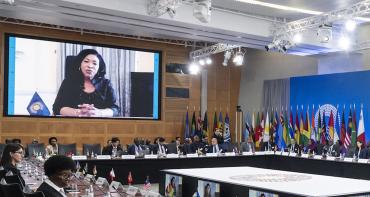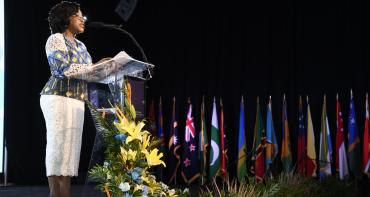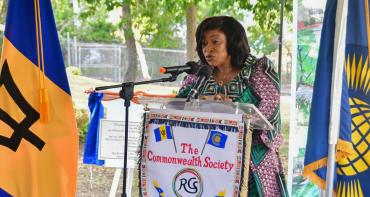Paris, 15 April: The Commonwealth and UNESCO have entered into a new agreement to cooperate in the areas of Education, Youth and Sport and Peace-building and Dialogue.

Paris, 15 April: The Commonwealth and UNESCO have entered into a new agreement to cooperate in the areas of Education, Youth and Sport and Peace-building and Dialogue.
Speaking at a signing ceremony at UNESCO’s headquarters in Paris, the Commonwealth Secretary-General said: “I am confident that this renewed partnership will lead to concrete results in a range of areas, from the development of curricula to support the Sustainable Development Goals to the creation of youth programmes to counter violent extremism.”
The Rt Hon Patricia Scotland QC went on to say that the two organisations were committed to working together to empower young people so they can tackle some of the world’s most pressing problems, from climate change to ending poverty.
.@PScotlandCSG: "@UNESCO & @commonwealthsec will promote respect & understanding as a means of combatting violence" pic.twitter.com/zmfyJaN3vN
— Irina Bokova (@IrinaBokova) April 15, 2016
The agreement will focus on collaborative approaches so that, for example, the Commonwealth’s on-line Education Hub can be used to promote UNESCO’s programme in Global Citizenship Education. Both organisations are interested in advancing the role of sport and physical education in realising development and peace objectives. And both are focused on preventing violent extremism by developing alternate narratives to those of extremist recruiters.
Irina Bokova, the Director-General of UNESCO, is pleased that the partnership has been renewed: “I believe the time has come, indeed to update it, to strengthen cooperation, with a focus on education, on youth empowerment, on promoting intercultural dialogue,”
During her visit, Patricia Scotland QC addressed UNESCO’s Executive Board, briefing them on her priority areas: ending domestic violence, reducing the impact of climate change and creating opportunities for young people.
UNESCO and the Commonwealth first signed a memorandum of understanding in 1980. This latest renewal will last for five years and will strengthen their ability to deliver concrete programmes on the ground.
#Commonwealth and @UNESCO renew ties: https://t.co/Bkig7CV3e9 #youth #education #SDP #peace #SDGs https://t.co/F8INTkyprG
— The Commonwealth (@commonwealthsec) April 15, 2016



